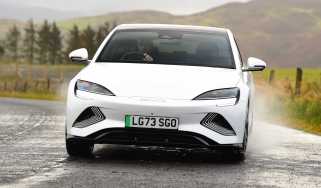"Fiat's model line-up is too small and too expensive"
Mike Rutherford thinks car companies such as Fiat should rely less on UK Government subsidies to help bail them out on EV sales, and focus more on resolving their in-house problems

Bosses at manufacturing firms in the UK have lately been getting on with what they do best: designing and building cars that proudly wear ‘made in Britain’ badges. So busy are they at producing and selling the goods that production is up in the first quarter of 2024 (over the same period last year). These companies have therefore had little time or inclination to publicly plead for pure-EV subsidies.
The likes of MINI and JLR are well aware of what they have to do for themselves. Besides, isn’t it a waste of time asking the current Government for help, understanding and subsidies when it’s likely to be booted out of office within a few weeks or months?
Conversely, foreign firms with zero car-making facilities in the UK, last week continued to bleat loudly about HM Treasury’s refusal to subsidise their electric cars.
Carlos Tavares, CEO of the Stellantis empire, blamed Blighty for some of the difficulties he faces as he tries to profitably sell his Peugeot, Citroen, Jeep and Vauxhall EVs, which sit alongside his Abarth, Alfa Romeo, Chrysler, Dodge, DS, Fiat, Lancia, Maserati, Opel and Ram models that saturate the market. Given that he’s responsible for so many brands, I’m surprised he found time to rubbish the UK’s “terrible” EV policy before adding that Britain’s automotive industry could be “killed” by its Zero Emission Vehicle (ZEV) mandate. More terrible than countless Vauxhall workers recently made redundant in the UK and, before that, the killing off of Peugeot’s Ryton factory and all the jobs that died with it, Mr T?
By coincidence (yeah, right) Fiat UK – a tiny part of the Tavares-run Stellantis empire – felt moved to formally “react after the UK Government ruled out the reintroduction of grants to support the purchase of electric cars”. Furthermore, it repeated its allegation that Britain’s ruling politicians are guilty of “sleepwalking into an EV crisis”, prior to claiming the electric-car market for the UK’s private buyers “is in real jeopardy”.
But perhaps Fiat should rely less on UK Government subsidies to help bail it out, and focus more on resolving its in-house problems – including a model line-up that’s too small and priced too high, thanks to some modest Fiat 500s costing £30k-plus. No wonder sales are down in the first quarter of ’24 and Fiat’s slice of the UK market is less than one per cent.
Mazda UK also got in on the act, stating: “we need to change the narrative around EVs.” Additionally, it’s accusing the Government of “not incentivising EV adoption”. But, again, the question is: should incentives for foreign-built cars be funded by the UK state (using money general taxpayers paid to HM Treasury) or should car companies be paying for their own sales-incentivisation programmes? True, Mazda has just reduced the price of its MX-30 slightly to £27,995. But this is a pure EV with a claimed maximum range of only 124 miles – which is less than the quoted and frankly hopeless distance the original Nissan Leaf could achieve a decade and a half ago. If, as it says, Mazda really feels the need to change the narrative, it can do so by building EVs that go further, cost less and come with increasingly common seven-year warranties.
Do you agree with Mike? Let us know your thoughts in the comments section...
Find a car with the experts



